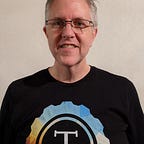Iterative Improvement
I was challenged this week in a “hot seat" Q&A session with my students about what my next big goal is in life. They also asked fun questions like how I convinced my wife to date me, and had I ever done anything illegal like hack into a computer. But this “next big goal” question startled me. I answered just about every other question without hesitation, but this one…
My entire life has been filled and fueled by curiosity. As a kid, I would tear things apart to see how they worked inside. When my dad bright home a Commodore 64 in the early 80’s, suddenly I could take digital things apart too and not have to worry as much about reconstruction of the now-destroyed plaything.
As a teenager I was into art and music, and math and science were necessary discomforts to my high school education. Looking back I guess I never had science or math teachers who tapped into my curiosity. I love the subjects now. I barely passed high school chemistry (51% was, technically, a pass), and now I love watching chemistry related things on YouTube.
Starting in electrical engineering and switching my major later to computer engineering helped solidify a career choice I’d made as an 8yr old breaking down video games written in BASIC. I’d found an industry that would never satiate my curiosity and drive to learn.
In the workforce, I’ve purposefully put myself in a ton of different industries learning how things work in the works around me, and how technology plays a part.
I’ve worked on operating systems software at QNX support and sales engineering roles. I’ve been in a systems engineering team at what is now March Networks, working on fiber optics systems, and satellite-based audio transmission systems. I worked in cryptography firmware at Chrysalis-ITS on hardware-based network security.
Moving to California, I worked at iCreditVision on credit reporting software and learning how personal credit worked to one’s advantage. I spent a year building out an online education platform at OUOA to build remote classrooms and on the fly quiz/polling systems. I got into e-commerce systems at PriceGrabber to learn how digital commerce was changing the world. I got into political systems working at the Los Angeles County Office of Education building threat response portals for schools. I spent some time working on entertainment software for Fox Networks. Online advertising wasn’t something I was super keen on at the time but the complex map-reduce system I built at The Rubicon Project managed analytics data for several trillion ad impressions in near real-time. I pursued gaming for a while and built out community platforms and micro-transaction systems at Armor Games.
Then onto more complex systems and architecture work at SendGrid learning how email and email marketing worked. Then a brief stint as Director of Engineering at Simple Energy, followed by failed Growth Hacker position at Stream which pivoted into highly successful Developer Relations work.
And then I joined the instructional staff at The Turing School of Software and Design. Here, I get to share the knowledge and wisdom gained over 23 years as a developer. If you factor in when I got the Commodore 64 and taught myself BASIC programming, I’ve actually been writing code for closer to 36 years.
Every Friday at Turing my students are sent a survey asking them what they enjoyed about their week. What did we do well to make them feel included in the classroom, what did we do well in our lessons to keep them engaged, and how can we improve.
The latter question, to me, is the most important. I’m very self-critical and sometimes focus too much on the input from students on suggestions where I can improve. It’s good because I can set goals around those improvements, but also bad because I can become a pendulum swinging from over-simplifying concepts to not simplifying the ideas enough. I have definite blind spots when it comes to the perspective of being a student in technology when it’s been such an important piece of my entire life.
But I still long for ideas on improvement, and I deeply appreciate the time my students take to fill out these surveys.
Hanging on my office wall are little notes of affirmation that other staff members have written about me. I have a mini-gong on my desk as a thank you for spending three years mentoring students at Turing before joining staff full time. I keep letters and cards from students thanking me for my time and effort helping them at Turing. I surround myself with these positive things, yet I still crave the critical feedback to help me improve.
Through this feedback, I take a very Agile approach to iterative design, applying it at a personal level. What’s one thing, maybe two things, I can change this coming week to make a lesson more engaging? How can I find better analogies to explain concepts to people in my classroom who haven’t had nearly 40 years being involved in technology in some form?
I’m excited for change on a regular basis. I don’t fear change, I chase it down and embrace it. I have to, because I have such a passion for teaching, and such an empathy to see my students succeed, that I feel I would fail them if I didn’t improve my own self.
As for that question that stumped me? I have no idea what my next, big goal would be. I joked that my next goal should be to figure out my next goal. I can’t see myself anywhere else in the near future than being an instructor at Turing. It’s exactly where I need to be at this time in my life and career.
